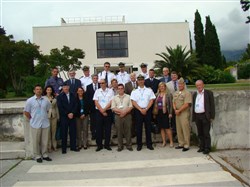A distress call! A ship collision with a ferry! Passengers injured! Thousands of gallons of oil leaking! This was the scenario presented last week to 20 participants of an Oil Spill Seminar held at Croatian Navy Headquarters in Split, Croatia. In this fictional scenario, a 176 meter cargo ship has collided with a 300 passenger ferry 25 kilometers off the Dalmatian coast in the Adriatic. Experts and decision-makers representing the Croatian military and six other ministries and organizations collaborated to develop a response to rescue passengers, stop the release of 2500 gallons of oil threatening their extensive coastline and islands, while potentially having to salvage the ship.

Participants from seven Croatian ministries and organizations work together to respond to fictional oil spill
During the 2.5 day workshop conducted from 21-23 May, participants representing Ministry of Defense (Navy and Coast Guard), Ministry of Environment, Ministry of Interior, Ministry of Maritime Affairs, Ministry of Agriculture, Directorate of Protection and Rescue, and Ferry Port-Split worked through options to respond to similar coastal crises. The workshop, facilitated by US European Command (USEUCOM), US Embassy’s Office of Defense Cooperation (ODC), Naval Sea Systems Command Supervisor of Salvage and Diving (NAVSEA SUPSALV), Navy Facilities Command (NAVFAC), and US Navy Sixth Fleet provided a forum for participants to exercise their national response in the event of an oil spill in accordance with Croatia’s Contingency Plan for Accidental Marine Pollution. The objectives of the workshop were to exchange ideas; build on past efforts; raise awareness on the national implications to tourism, economy and environmental preservation in the event of an off-shore oil spill; and increase preparedness, planning, response and recovery to environmental disasters in order to enhance coastal resiliency.

Cargo ship fire off coast of Croatia, Feb 2008
With over 1400 tankers, cargo ships and ferries moving through the Adriatic a year, the threat of a maritime accident and subsequent release of fuel or other chemicals is of great concern to a country such as Croatia with more than 1000 islands and about 12% of their GDP derived from tourism. Disasters such as the cargo ship fire off the coast of Croatia in 2008, the Costa Concordia grounding off the coast of Italy in 2012, and most recently the collision of a cargo ship with the Port Control tower a few weeks ago in Genoa, Italy, re-emphasize the requirement to be prepared for these types of incidents. The consensus among participants is that another maritime crisis in the Adriatic is not a matter of “if,” but a matter of “when.&rdquo

Participants of the Oil Spill and Coastal Resiliency Workshop Split, Croatia 21-23 May
This workshop, funded by Office of Secretary of Defense’s (OSD) Defense Environmental International Cooperation (DEIC) program, is an excellent example of military-to-military cooperation with civil authority participation. The workshop was executed by EUCOM’s ECJ4-Engineering Division and aligned with ECJ5 Strategy under the Environmental Security Line of Activity (LOA). Under the Environmental Security LOA, EUCOM partners with allies and other European nations to strengthen relationships, improve interoperability, or assist in meeting NATO capability goals. This seminar is the third engagement on this topic since 2010, and has provided the groundwork from which the Croatian Coast Guard has built their own SOP in response to an oil spill. The information exchanges are also mutually beneficial – through this partnership the US has learned a lot about how the Croatians would respond to a major oil spill, how we may be asked to assist if needed, and how collectively we may be able to respond to such disasters. The workshop was viewed as highly successful and productive by all participants, and has hopefully helped to bring our partners one step further along the path of maritime disaster preparedness.






